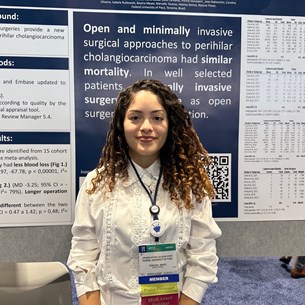Meeting
2023 ASCO Annual Meeting

Federal University of Piaui, Teresina, Brazil
Laynara Vitória Da Silva Vieira , Mee Joo Kang , Marina Marangoni Roschel , Alana Bruna Krug , Luana Dornelas , Monique Vilela Gomes , Camile Fernanda Squisatti , Yasmin Alves Peterson , Beatriz Meneses , Maria Eduarda Rodrigues Peixoto , Maria Eduarda Cavalcanti Souza , Luiza Carvalho , Vitória Donadoni Costa , Joao Miguel Rabeschini , Carolina Furtado de Oliveira , Isabela Rutkowski , Beatriz Meyer de Souza , Marcella Eduarda de Aguiar Tavares , Heloisa Griese Luciano Santos
Background: Robotic and laparoscopic surgeries provide a new approach for patients with perihilar cholangiocarcinoma (pCCA). However, whether it can achieve similar outcomes to traditional open surgery (OS) remains controversial. Therefore, to compare the outcomes of laparoscopic/robotic surgery with open surgery and investigate the efficiency for Klatskin tumors further, we systematically summarized the currently available data and performed a meta-analysis. Methods: A systematic review and meta-analysis were conducted to examine the most recent studies on the topic. The search was updated to January 15, 2023, and was performed on PubMed, LILACS, and Embase. The inclusion criteria were case cohort comparing two arms: robotic or laparoscopic and open surgery for pCCA, based in PICOS principle, while the exclusion criteria were review, letter, and articles with incomplete data. All the included literature was evaluated for quality and risk of bias using the Joanna Briggs Institute's critical appraisal tool and the data were extracted and entered into an Excel spreadsheet by two authors. The data was then analyzed using Review Manager 5.4 applying Odds Ratio and Mean Difference. The study protocol was registered in PROSPERO (CRD42023388478) and was conducted following the PRISMA 2020 checklist. Results: A total of 1133 patients were included in the study (411 laparoscopic/robotic, 722 open surgeries), 15 retrospective cohort were used in the meta-analysis. The meta-analysis revealed that laparoscopic surgery resulted in less blood loss (Mean difference -77.87; 95% CI = -89.97, -67.78; p < 0,00001, I²= 84%), shorter hospital stay (Mean difference -3.25; 95% CI = -4.83, -1.67; p < 0,0001, I²= 79%) but longer operation time (Mean difference 53.95; 95% CI = 48.09, 59.81; p < 0,00001, I²= 86%). The mortality rate was not significantly different between the two groups (odds ratio = 0.82; 95% CI = 0.47 a 1.42; p = 0.48; I²= 0%). Both surgeries showed similar results for age (Mean difference 1.71; 95% CI = -0.62, 4.03; p =0.15, I²= 53%), bilirubin (Mean difference -43.45; 95% CI = -77.11, -9.79; p< 0.01, I²= 0%), BMI (Mean difference 0.25; 95% CI = -0.24, 0.74; p= 0.31, I²= 0%), and tumor diameter (mean difference -0.06; 95% CI = -0.52, 0.40; p =0.80, I²= 0%). Conclusions: The limitations of the study evidence are due to the small number of patients included in each article. Concerning blood loss and hospital stay, minimally invasive surgery offers better results. However, open surgery still has a shorter operating time. Both surgeries had similar results in mortality. Minimally invasive surgery is as safe as open surgery for pCCA resection.
Disclaimer
This material on this page is ©2024 American Society of Clinical Oncology, all rights reserved. Licensing available upon request. For more information, please contact licensing@asco.org
2023 ASCO Annual Meeting
Poster Session
Gastrointestinal Cancer—Gastroesophageal, Pancreatic, and Hepatobiliary
Gastrointestinal Cancer—Gastroesophageal, Pancreatic, and Hepatobiliary
Hepatobiliary Cancer - Local-Regional Disease
J Clin Oncol 41, 2023 (suppl 16; abstr 4127)
10.1200/JCO.2023.41.16_suppl.4127
4127
448
Abstract Disclosures
2022 ASCO Annual Meeting
First Author: Mihir Shah
2024 ASCO Annual Meeting
First Author: Arun Kumar
2023 ASCO Annual Meeting
First Author: Thomas J Roberts
2023 ASCO Annual Meeting
First Author: Lorenzo Guidi